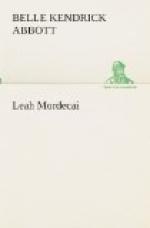“Good-by again, girls,” said Bertha Levy gayly, as the coach door closed; “riding is rather better than walking, such a day as this. Remember to-morrow night.” Then, with a dash, the carriage was out of sight.
“Well, Lizzie,” resumed Bertha, smiling significantly, for she could not but observe Helen’s manifest preference in offering Leah a seat with her, “we need not stand here any longer. I see that the rain, out of consideration for us, is about to cease, and I don’t think any coach is coming for me. Do you expect one?”
To this characteristic remark, Lizzie Heartwell replied smilingly, “I guess, Bertha, with umbrellas, overshoes, and care, we can reach home without serious damage.”
“But care is not a coach, you know, my friend, no matter how we turn it,” said Bertha laughingly, as she donned the wrapping and overshoes. “I am as hungry as a wolf, and I fear mamma will let that young brother of mine eat all my dinner, if I am too slow in getting there. Boys are perfect cormorants, anyhow. Come, let’s go at once.”
The two girls stepped out into the slippery street, and turned their faces homeward. “I am glad, Lizzie,” continued Bertha, as they turned corner after corner, “that our paths run together so far; having company is so much better than being alone this forlorn afternoon. And remember, I desire to know the answer to my invitation as early as possible. To-morrow is my brother Isaac’s confirmation day, and we must all be promptly at the synagogue at nine o’clock.”
“You shall know to-night, Bertha, and I will be with you, if possible. But here, before we part, let’s stop and buy some bananas of old Maum Cinda. She is always so grateful for a fivepence dropped by a school-girl.”
By this time the two girls were standing in front of the well-known fruit-stall of the old blind colored woman known far and near through the Queen City as “Maum Cinda.” For years, hers had been the important market for supplying the school-children with luscious fruits, unimpeachable taffy, and ground-pea candy.
“An’ bless de Lord, is it Miss Lizzie?” said the good-natured woman, as the sound of Lizzie Heartwell’s voice fell upon her ear in the kindly spoken salutation.
“An’ w’at will you have to-day, chile?”
“Some bananas, Maum Cinda—two for me, and two for my friend here, Miss Bertha Levy.”
“Oh! yes, Miss Bertha,” replied the woman, courtesying, “an’ maybe I have seen Miss Bertha, but it’s the sweet voice of Miss Lizzie that the old blind woman remembers”—handing the bananas across the wide board that protected her tempting wares from public incursions.
“You flatter me, Maum Cinda; but I hope the rainy day has not interfered much with your trade. Here”—and extending her slender white hand, Lizzie dropped the jingling pennies into the aged, wrinkled one that opened to receive them.
“God bless you, chile. You neber forget His poor ones, de blind. God bless you!”




